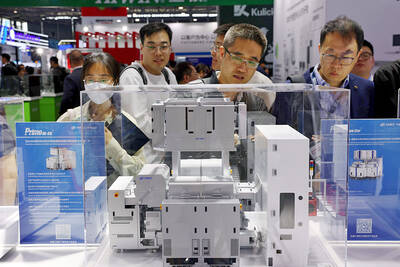MiTAC International Corp (神達集團) unveiled its latest GPS phone yesterday, the Mio Leap K1, which features a pedestrian GSP navigation system and extra cellphone capabilities.
The phone has dual screens: a 1.7 inch screen in the front for phone services and another 2.6 inch screen on the back dedicated to the GPS system.
“Mio users can simultaneously talk on the phone and find directions without ever losing their connection, through its embedded advanced sensors,” said Steve Chang (張樂群), senior director of the marketing center office at Mio Technology Corp (宇達股份有限公司), a MiTac subsidiary.
The phone has a more precise location identification for pedestrians moving at slower speeds, thereby overcoming previous obstacles that had location identification feasible only for vehicles, he said.
Weighing 125g, Leap KI, which runs on Windows CE system, will retail for NT$12,800 (US$421) when it goes on sale domestically next month.
The Leap K1 is MiTAC’s sole venture into the pedestrian GPS market. It has a series of five Mio Moov products for the traditional car GPS market coming out in the second half of this year.
John Cheng (鄭若望), a market analyst at IDC Taiwan, expressed concern yesterday over the growth potential for the local smartphone market.
“Figures show that in Taiwan alone, sales of handset devices are relatively stable, meaning that there is literally little to no growth,” he said.
“We are looking at on average 7 million units of sales per year, or roughly 1.8 million units per quarter,” he said.
Globally smart phone or converged device takes up only 9 percent to 10 percent overall cellphone market, Cheng said.
“Most people primarily use their handsets as phones. The exorbitant monthly carrier, voice and data fees and high device unit cost are two reasons people are staying away from using converged devices,” he said.
Cheng said MiTAC remains Taiwan’s largest GPS mobile device manufacturer, despite competition from AsusTek Computer Inc (華碩) and HTC Corp (宏達電).
Whether buyers for Leap K1 will come primarily from the traditional cellphone market or from the GPS market is not yet clear.
But Kirk Yang (楊應超), former head of Asian technology hardware research with Smith Barney Citigroup and now CFO at Ta Yang Group(大洋集團), is optimistic about the new product’s chances.
As new products always have high profit margins, Yang said it was important for companies to be the first to come up with devices catering to the ever-changing needs of mass consumers in the critical first three to six month period.
Yang said MiTAC seems to be ahead of the game this time with the Mio Leap K1.
“By coming out with a new product or product focus, MiTAC is targeting an untouched market segment,” he said.
“This strategic move is very clever and could be extremely lucrative,” he said.
MiTAC closed up NT$0.40, or 1.9 percent, at NT$21.40 yesterday in Taipei trading.

With this year’s Semicon Taiwan trade show set to kick off on Wednesday, market attention has turned to the mass production of advanced packaging technologies and capacity expansion in Taiwan and the US. With traditional scaling reaching physical limits, heterogeneous integration and packaging technologies have emerged as key solutions. Surging demand for artificial intelligence (AI), high-performance computing (HPC) and high-bandwidth memory (HBM) chips has put technologies such as chip-on-wafer-on-substrate (CoWoS), integrated fan-out (InFO), system on integrated chips (SoIC), 3D IC and fan-out panel-level packaging (FOPLP) at the center of semiconductor innovation, making them a major focus at this year’s trade show, according

DEBUT: The trade show is to feature 17 national pavilions, a new high for the event, including from Canada, Costa Rica, Lithuania, Sweden and Vietnam for the first time The Semicon Taiwan trade show, which opens on Wednesday, is expected to see a new high in the number of exhibitors and visitors from around the world, said its organizer, SEMI, which has described the annual event as the “Olympics of the semiconductor industry.” SEMI, which represents companies in the electronics manufacturing and design supply chain, and touts the annual exhibition as the most influential semiconductor trade show in the world, said more than 1,200 enterprises from 56 countries are to showcase their innovations across more than 4,100 booths, and that the event could attract 100,000 visitors. This year’s event features 17

Germany is to establish its first-ever national pavilion at Semicon Taiwan, which starts tomorrow in Taipei, as the country looks to raise its profile and deepen semiconductor ties with Taiwan as global chip demand accelerates. Martin Mayer, a semiconductor investment expert at Germany Trade & Invest (GTAI), Germany’s international economic promotion agency, said before leaving for Taiwan that the nation is a crucial partner in developing Germany’s semiconductor ecosystem. Germany’s debut at the international semiconductor exhibition in Taipei aims to “show presence” and signal its commitment to semiconductors, while building trust with Taiwanese companies, government and industry associations, he said. “The best outcome

Semiconductor equipment billings in Taiwan are expected to double this year, as manufacturers in the industry are keen to expand production to meet strong global demand for artificial intelligence applications, according to SEMI, which represents companies in the electronics manufacturing and design supply chain. Speaking at a news conference before the opening of Semicon Taiwan trade show tomorrow, SEMI director of industry research and statistics Clark Tseng (曾瑞榆) said semiconductor equipment billings in Taiwan are expected to grow by an annual 100 percent this year, beating an earlier estimate of 70 percent growth. He said that Taiwan received a boost from a